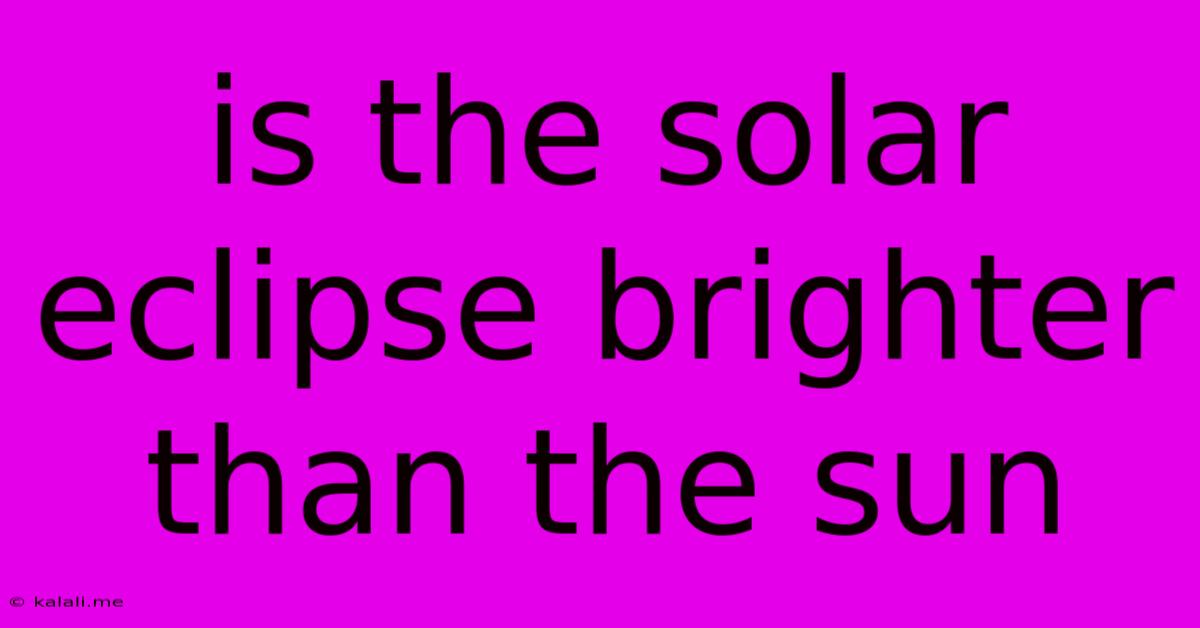Is The Solar Eclipse Brighter Than The Sun
Kalali
Jun 04, 2025 · 3 min read

Table of Contents
Is a Solar Eclipse Brighter Than the Sun? Understanding the Brightness During a Solar Eclipse
Meta Description: Discover the truth about the brightness of a solar eclipse. Learn why looking directly at the sun, even during an eclipse, is incredibly dangerous and how the apparent brightness changes during the different phases.
The short answer is a resounding no. A solar eclipse is never brighter than the sun. In fact, it's significantly dimmer. The misconception likely stems from the dramatic visual effect of the moon obscuring the sun, creating a momentary darkness that can be quite striking. However, this darkness is a result of the sun being blocked, not an increase in brightness.
Let's delve deeper into why this is the case and address some common misconceptions.
Understanding the Brightness of the Sun
The sun's brightness is immense. It's the primary source of light and heat for our planet, radiating an incredible amount of energy. This brightness is consistent, although it can vary slightly based on solar activity.
What Happens During a Solar Eclipse?
A solar eclipse occurs when the moon passes between the sun and the earth, casting a shadow on the earth. This shadow isn't a complete blackout; instead, it dramatically reduces the amount of sunlight reaching the Earth's surface. During a total solar eclipse, the sun's corona (the outer atmosphere) becomes visible, appearing as a faint, ethereal glow around the moon.
Why a Solar Eclipse Appears Darker, Not Brighter
The perceived darkness during a solar eclipse is a result of the sun's light being blocked by the moon. The moon doesn't emit its own light; it reflects sunlight. Therefore, during a solar eclipse, the moon's shadow significantly reduces the intensity of the sunlight reaching the Earth. This reduction in sunlight causes the dramatic darkening, but this darkness is far from brighter than the sun itself. The corona, while visible, is far less bright than the sun's surface.
The Danger of Looking Directly at the Sun
It is extremely dangerous to look directly at the sun during any phase of a solar eclipse, even when it's partially obscured. The sun's intense radiation, including ultraviolet and infrared light, can cause severe and permanent eye damage, leading to conditions like solar retinopathy. Never look at the sun without proper eye protection specifically designed for solar viewing.
Different Phases of a Solar Eclipse and Brightness
The apparent brightness changes throughout the different phases of a solar eclipse:
- Partial Eclipse: The sun appears partially obscured, and the brightness is reduced but still dangerously intense.
- Total Eclipse: During the brief period of totality, the sun's corona is visible, creating a significantly dimmer environment than during a partial eclipse. However, even then, the sun itself is not brighter.
- Annular Eclipse: The moon is further away from Earth, creating a "ring of fire" effect. The brightness remains significantly lower than the sun's full brightness, but still poses a substantial risk to unprotected eyes.
In conclusion, a solar eclipse is not brighter than the sun; it is dramatically dimmer. The perceived darkness is due to the moon blocking the sun's light. Always prioritize eye safety when observing a solar eclipse and use approved solar viewing glasses to prevent permanent damage. The beauty of a solar eclipse should never come at the cost of your eyesight.
Latest Posts
Latest Posts
-
How Do You Remove Ink From Hands
Jun 05, 2025
-
How To Trace Water Lines In House
Jun 05, 2025
-
What Is Negative Times A Negative
Jun 05, 2025
-
How To Import A Page Desing Into Wordpress
Jun 05, 2025
-
Can You Say Mourners Kaddish For A Friend
Jun 05, 2025
Related Post
Thank you for visiting our website which covers about Is The Solar Eclipse Brighter Than The Sun . We hope the information provided has been useful to you. Feel free to contact us if you have any questions or need further assistance. See you next time and don't miss to bookmark.